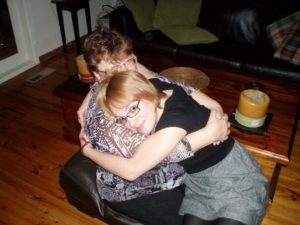It has been more than 7 years since Katie nearly lost her life to sepsis. In early 2010, Katie was a recent high school graduate and looking forward to studying make-up artistry. Then 18 years old, Katie developed a renal abscess that led to septic shock. At first, she assumed she had the flu and remembers feeling unwell for a week or so. One night she had back pain that was so excruciating she could only crawl to the bathroom.
A visit to a GP revealed Katie likely had a urinary tract infection (UTI). She returned home but remained in pain, with fever and constant vomiting. At one point she developed uncontrollable tremors and was unable to walk. Katie recalls being conscious of what she was saying to her then-boyfriend – she was so convinced she was going to die and wanted him to remember her has a good and kind person.
Katie’s partner eventually took her to the emergency department at the nearest hospital, on advice from his mother. She says she felt so unwell at this point, it is ‘indescribable’.
Katie and her mum shortly after her time in hospital
Arriving at the hospital, Katie could not stand or walk on her own, and was very confused – unable to answer simple questions about what day it was or how old she was. She was transferred to a larger hospital nearby, where she had a central line and an arterial line inserted, to monitor her dangerously low blood pressure.
A CT scan confirmed a renal abscess, caused by the UTI. Katie’s body had developed sepsis in response to the infection.
Katie’s memory of this time is very patchy: she was confused, scared, and felt completely alone.
Shortly after – and despite being so unwell – she was transferred once again, this time to Melbourne’s Austin Hospital. The medical staff there were surprised Katie had survived the ambulance trip, and immediately placed her in the intensive care unit (ICU), where she was given adrenaline. Doctors tried to treat the infection with IV antibiotics, but the bacteria was resistant to all antibiotics. As a last resort, a drain was inserted into the abscess – without anaesthesia, as Katie was too sick to be put under. She remembers this being extremely painful, but is thankful for the procedure as it saved her life.
Katie was in ICU for close to a week, and then transferred to a ward as she began to recover. She suffered a collapsed lung and constant pain, and was also diagnosed with glandular fever, but her parents were by her side the entire time. She has a happy memory of her parents ‘busting her out’ one afternoon for lunch at McDonalds.
After two weeks on a general ward, Katie was discharged from hospital. She had to learn to walk again, and it took two years for her to feel recovered. But more than 7 years on, Katie is still experiencing the impact of sepsis. She takes sleep medication every night, and suffers from ongoing muscle pain. Like many sepsis survivors, Katie has been diagnosed with post-traumatic stress disorder (PTSD).
Katie today
‘A lot of the time when people around you see your body has healed, they assume you have also healed emotionally’ says Katie. ‘But the emotional stuff tends to stick around for a lot longer’.
Katie’s experience with sepsis has inspired her to help others, and she is now halfway through a nursing degree. As a passionate sepsis awareness advocate, Katie wants to help other survivors feel less alone, and to raise awareness of sepsis within the community. She is grateful for the doctors and nurses who cared for her and saved her life. As a nurse, she hopes to do the same for someone one day.



